Gain access to valuable insights for building lasting customer relationships.
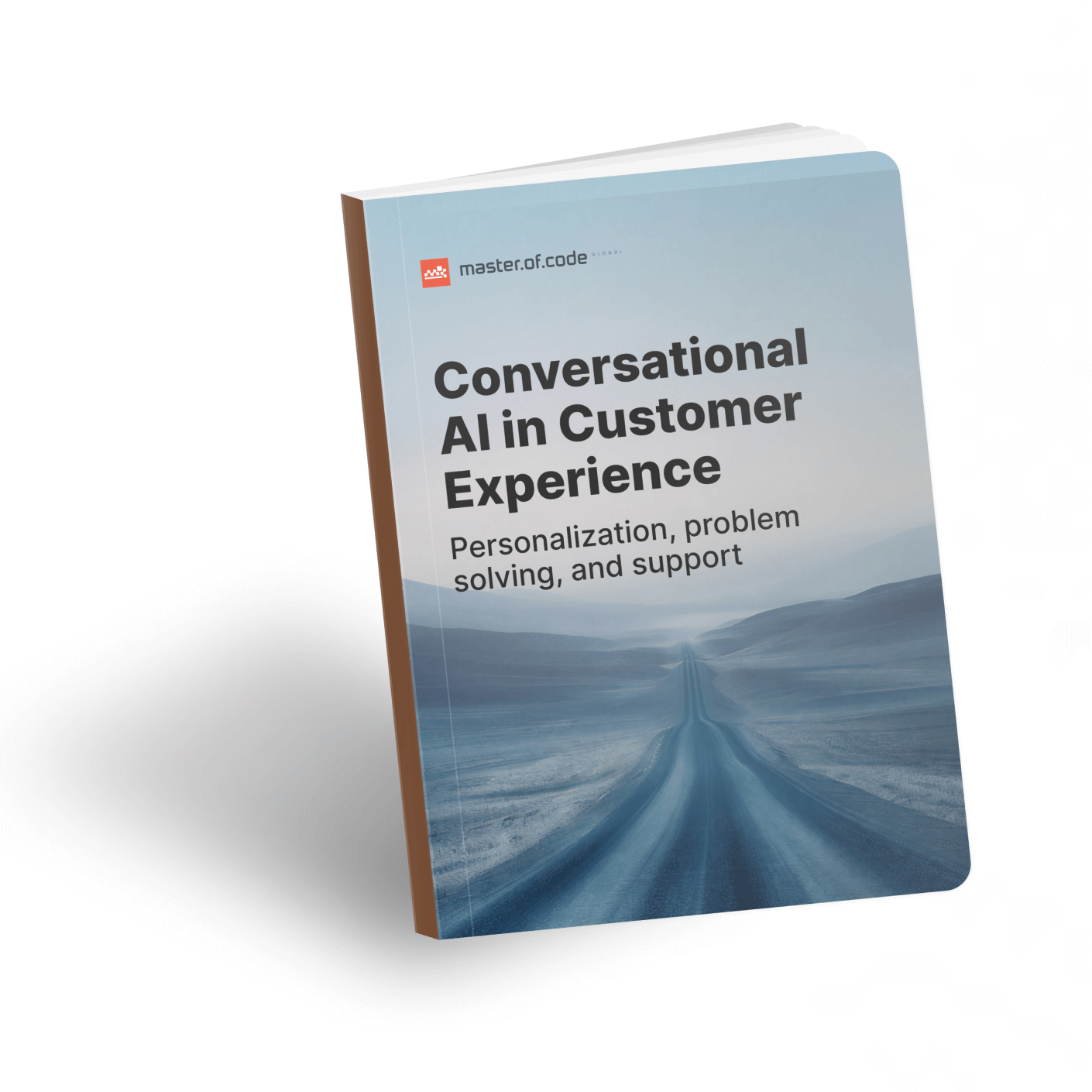
From powering virtual assistants to transforming customer service, Conversational AI solutions have been a game-changer for businesses. Now with the latest advancements in Generative AI and Large Language Models, the possibilities are endless. Conversational AI can revolutionize your CX, streamline internal processes, drive revenue growth and so much more! It’s time for your organization to embrace this transformative technology.
Table of Contents
Conversational AI: Definition and Key Elements
Continuing its impactful journey, Conversational AI remains at the forefront of transforming the customer service domain. Leveraging the power of artificial intelligence (AI) and natural language processing (NLP), Conversational AI systems are designed to facilitate seamless and human-like interactions between customers and businesses. By simulating human conversation, these systems enhance user engagement, provide real-time support, and contribute to overall customer satisfaction.
Conversational AI’s Distinctive Features
Conversational AI stands out for its capacity to understand and generate human language authentically. In contrast to rigid chatbots for customer service relying on scripts, it grasps language nuances, context, and intent through advanced technologies:
- NLP: NLP deciphers user inputs, considering structure, semantics, and sentiment. This enables contextually accurate responses.
- Machine Learning: Conversational AI learns from interactions, adapting to understand customer intent and provide appropriate replies over time.
- Speech Recognition: Some systems handle spoken language, using speech recognition to enable seamless voice interactions.
- Intent Recognition: Effective AI understands user objectives, providing accurate and targeted support.
Incorporating these advanced features, Conversational AI goes beyond scripted responses to provide genuine and context-aware interactions.
Core Mechanisms of Conversational AI
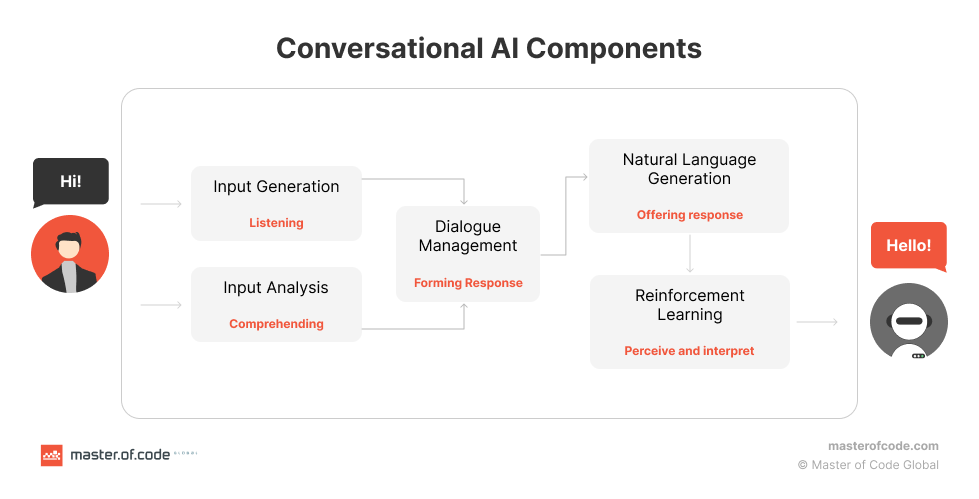
Delving into its core operations, Conversational AI orchestrates a blend of technologies for a human-like interaction:
- User Input Analysis: AI scrutinizes user input using NLP and intent recognition, discerning intention from sentence structure and keywords.
- Contextual Understanding: Considering prior interactions, Conversational AI ensures coherent, context-aware responses.
- Response Generation: AI crafts responses based on input and context, addressing user queries effectively – text, images, links, or dynamic content as needed.
- Personalization: By recalling customer’s preferences, AI tailors responses for a more user-centric experience.
- Learning and Improvement: After interactions, AI learns from errors and feedback, refining future responses in an ongoing cycle.
Through this well-coordinated process, Conversational AI creates smooth, flexible conversations that consistently improve user experiences.
Why do Conversational AI solutions matter for your business?
Conversational AI has become a transformative technology with significant potential for businesses across industries. By leveraging Conversational AI across various departments, businesses can enhance customer service, sales, marketing, and support functions, driving overall organizational success.
- Revenue Growth: The Boston Consulting Group highlights that investing in AI has the power to triple company revenue. By leveraging Conversational AI solutions, businesses can tap into new revenue streams, improve customer interactions, and drive growth.
- Profitability Boost: Accenture’s research indicates that AI can boost profitability by an average of 38% across 16 industries by 2035. This demonstrates the long-term impact and sustainability of adopting Conversational AI solutions.
- Operational Efficiency: Chatbots have proven to be valuable tools in cutting operational costs, with companies experiencing a 30% reduction. This cost-saving advantage allows businesses to optimize their resources and allocate them more effectively.
- Cost Savings: Companies saved a staggering $1.34 billion in 2024 by utilizing chatbot technology. This significant amount showcases the financial benefits of implementing Conversational AI solutions for customer service and the potential for continued savings in the future.
- Enhanced productivity: The application of Generative AI chatbots significantly enhances the effectiveness of customer support agents, as revealed by a recent study from Stanford and MIT based on data from 5,179 agents and 3 million chats. The findings indicate that Generative AI improves the performance of less skilled and less experienced workers, leading to a remarkable 13.8% increase in successfully resolved chats per hour and facilitating accelerated progress down the experience curve for newer agents.
- Digital Engagement: Salesforce’s data reveals that 57% of customers prefer to engage with companies digitally. This highlights the growing importance of providing seamless and personalized digital experiences, where Conversational AI plays a pivotal role.
- Customer Preference: Outgrow’s research indicates that 56% of customers prefer using chatbots over call centers. This preference showcases the increasing acceptance and trust in AI-powered conversational experiences, leading to higher customer satisfaction.
- Increased Adoption: Interactions with virtual assistants have skyrocketed by 250% across industries since the pandemic, as reported by Gartner. This surge in usage indicates the growing reliance on Conversational AI technologies for various customer service needs.
- Future Outlook: Gartner predicts that by 2027, 1 in 4 organizations will use chatbots as their primary customer service channel. This projection underlines the transformative impact of Conversational AI and the need for businesses to embrace it to stay competitive.
We’ve compiled how Conversational AI can support and elevate every business department. Read our list of the best applications of Conversational AI within any organization.
Conversational AI for Customer service & Contact centers
In today’s competitive business landscape, customer service plays a vital role in customer retention and loyalty. Conversational AI offers a transformative solution by automating up to 80% of customer queries and reducing customer service costs by 40% (Gitnux) or even up to 70% (Deloitte).
Analyzing the data, Conversational AI’s ability to automate a significant portion of customer queries brings tangible advantages. By providing customers with a self-service channel that offers prompt answers, businesses can enhance the customer experience, improve satisfaction, and drive loyalty. Moreover, leveraging Conversational AI enables agents to handle more complex queries, resulting in increased productivity and cost savings. Master of Code’s Chatbot ROI calculator allows businesses to assess the potential savings and benefits for their specific context for Conversational AI for Customer service.
Benefits of Conversational AI for Customer service
Conversational AI can:
- Boost employee satisfaction and reduce agent attrition by automating common queries and streamlining tasks, allowing your agents to focus on more complex, high-value queries.
- Enable your customers to fully self-serve, increasing customer satisfaction and reducing the load on your contact center team.
- Arm your agents with deeper customer context by collecting valuable information upfront before handover.
- Empower agents to best resolve customer complaints by integrating Generative AI to accurately detect customer sentiment.
- Save your agents valuable time on post-resolution reporting by automatically summarizing and classifying customer queries.
Conversational AI Use Cases in Customer Service
Enhancing customer service reaches new heights with the versatile applications of Conversational AI. By seamlessly integrating advanced technology into various aspects of customer interaction, businesses can boost customer experiences. Here are some critical areas where Conversational AI for customer support makes a remarkable impact:
- Enabling Inclusive Services: Conversational AI ensures services are accessible to all users, catering to diverse needs and preferences. It provides a user-friendly interface for individuals with varying abilities, enabling seamless interaction without barriers.
- Optimizing Account Management: From updating account information to handling transactions, Conversational AI streamlines account-related tasks, providing swift and efficient assistance. Users can easily check balances, make transfers, or update account details through natural conversations.
- Handling FAQs: Conversational AI efficiently handles common queries, offering instant solutions and freeing up customer support agents for more complex issues. This accelerates response times and improves customer satisfaction.
- Safe Authentication: Utilizing advanced security measures, Conversational AI verifies customers securely, protecting sensitive information and enhancing user trust. It employs multi-factor authentication and biometric recognition to ensure only authorized users access their accounts.
- Easy Booking Assistance: Whether it’s scheduling appointments, booking reservations, or arranging services, Conversational AI simplifies the process, providing convenient assistance. Users can seamlessly book flights, reserve tables, or schedule appointments through natural conversations.
- Identifying User Intent: Through sophisticated intent recognition, Conversational AI grasps user needs accurately, ensuring responses are relevant and helpful. It understands nuanced queries, enabling more precise guidance and problem-solving.
- Multilingual Services: Conversational AI breaks language barriers by offering multilingual assistance, ensuring a seamless experience for customers worldwide. This fosters inclusivity and allows businesses to cater to diverse audiences.
- Monitoring Orders: Keeping customers informed about their orders in real time, Conversational AI offers updates on shipment status and delivery times. It reduces customer anxiety and increases transparency in the purchasing process.
- Enhanced Payment Management: Conversational AI customer service facilitates smooth payment processes, simplifying transactions and reducing friction for customers. It securely handles payments, provides billing information, and offers seamless checkout experiences.
- Troubleshooting Assistance: Whether it’s technical issues or operational challenges, Conversational AI assists users in resolving problems efficiently, reducing frustration and downtime. It provides step-by-step guidance to troubleshoot issues and guides users through potential solutions.
From accessibility to convenience, security to support, the synergy between Conversational AI and customer service is an inseparable dynamic, redefining how businesses connect with their customers and paving the path for heightened satisfaction and lasting loyalty.
Read also: Other Conversational AI use cases
Optimizing Customer Service with Conversational AI: Core Approaches
Conversational AI is a powerful tool that can be used to improve customer service. By following four essential strategies businesses can maximize the benefits of Conversational AI solutions for their customers. These tactics include:
- Putting Customers First: By infusing personalization into conversations, Conversational AI adapts to individual customer preferences. This strategy creates a more profound connection as the AI understands and addresses specific requirements.
- Developing a Comprehensive Knowledge Base: Strengthen your AI’s capabilities by creating a comprehensive knowledge base. This approach equips the AI with accurate, up-to-date information, ensuring it can provide precise and informed responses.
- Picking the Ideal Conversational AI for Your Business: Recognizing the uniqueness of industries, opt for a Conversational AI solution tailored to your business domain. This approach enhances the relevance and effectiveness of interactions, catering to the distinct needs of your sector.
- Continuous Performance Tracking and Optimization: Sustain the AI’s effectiveness through continuous evaluation. Regularly monitor performance, gather user feedback, and refine responses to ensure the AI remains dynamic and consistently meets evolving customer expectations. This is where conversation analytics becomes essential — turning live customer interactions into clear signals about intent gaps, escalation patterns, and experience friction that teams can act on immediately.
In conclusion, harnessing the potential of Conversational AI can significantly enhance customer service. By implementing the core approaches outlined above, businesses can ensure they make the most of this powerful technology.
Conversational AI solutions for Marketing teams
Conversational AI can be a powerful tool for marketing teams to drive lead conversion rates and reduce costs. According to Spice Works, Conversational AI can increase lead conversion rates between 10% to 30%, which is a significant improvement. Additionally, McKinsey reports that Conversational AI can reduce marketing costs by up to 20%.
The ability to understand customer needs, preferences, and purchasing history is crucial for creating effective and personalized marketing campaigns. Conversational AI can provide valuable insights into customer behavior and help marketing teams to tailor their messaging accordingly. Conversational AI solutions have the potential to transform the way that marketing teams engage with customers and drive business results.
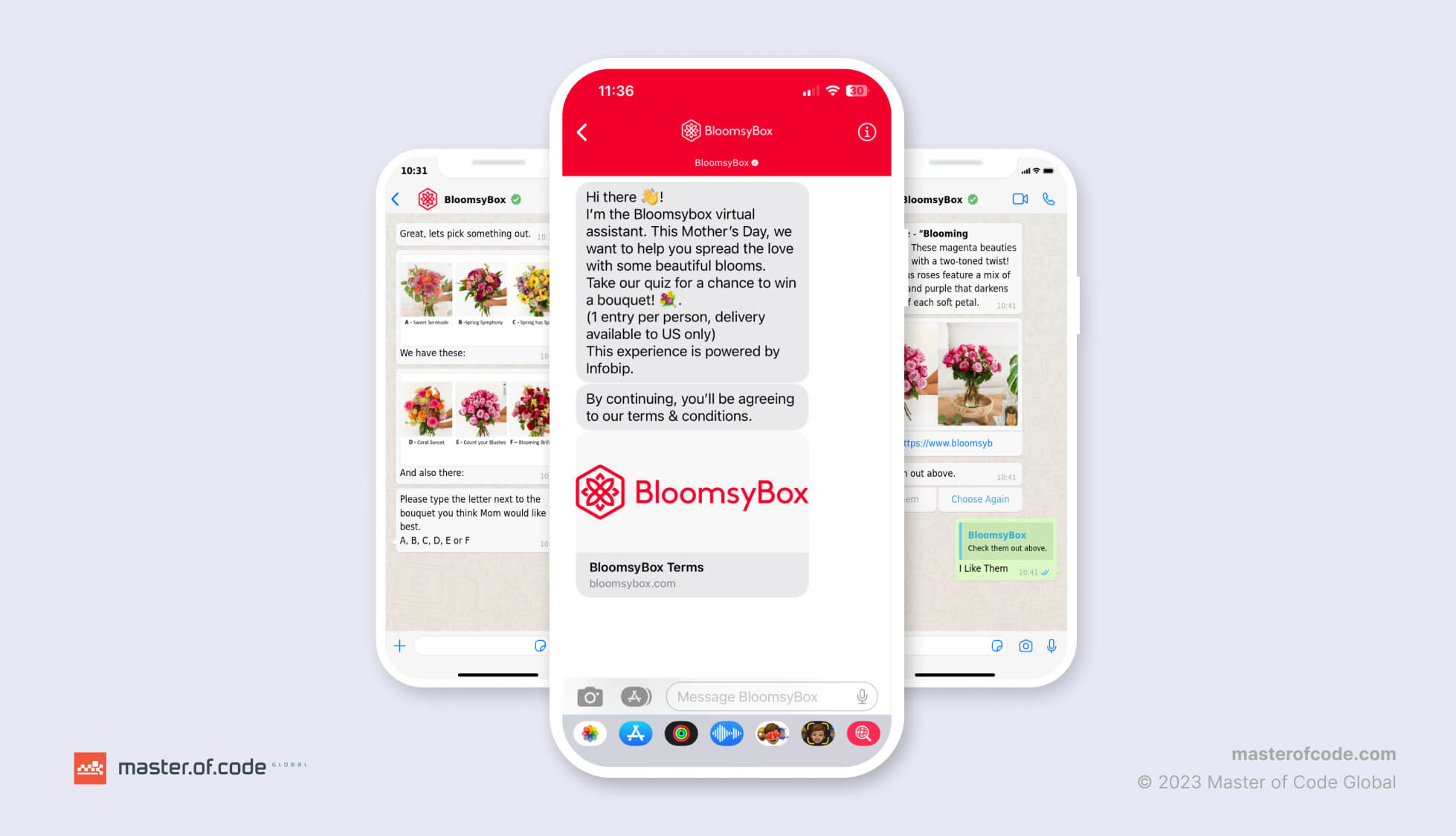
Benefits of Conversational AI solution for Marketing team
- Proactive and personalized marketing campaigns: Conversational AI enables marketing teams to create highly targeted and personalized campaigns. By understanding customer needs, preferences, and purchasing history, businesses can deliver relevant messages and offers, increasing customer engagement and conversion rates.
- Multi-channel campaign delivery: With Conversational AI marketing campaigns can be delivered through various chat channels, such as SMS and messaging apps. This multi-channel approach expands reach and enables businesses to connect with customers on their preferred platforms.
- Improved SEO optimization: Conversational AI solutions can assist in optimizing SEO strategies by understanding user intent and behavior. This helps drive more traffic to digital assets and improves organic search rankings.
- Data-driven insights and campaign analysis: Conversational AI provides valuable data and insights on campaign performance. Marketing teams can leverage these insights to make informed decisions, refine strategies, and measure the impact of their marketing efforts.
- Enhanced email marketing effectiveness: By leveraging Conversational AI, businesses can optimize and personalize email marketing campaigns. AI algorithms can determine the best content, delivery times, and frequency, resulting in improved email open and click rates. But to truly maximize impact, knowing how to find email address is just as crucial—it keeps your list clean and ensures your campaigns reach the right, engaged recipients.
- Efficient content generation: Conversational AI solutions can generate marketing content at scale, enabling marketing teams to launch campaigns faster. This automation streamlines content creation processes and ensures consistent messaging across multiple channels.
Conversational AI Solutions for Sales
According to Salesforce, implementing Conversational AI solutions can lead to an increase in leads by more than 50%, while Gitnux reports an increase in sales by 67%. These results are significant for businesses looking to grow and expand their customer base. Understanding customer needs and preferences is crucial for creating effective marketing campaigns and driving revenue. By using Conversational AI, sales teams can gather valuable data on customer behavior, preferences, and buying habits, which can inform their strategies and lead to better results. Ultimately, Conversational AI can help businesses achieve their sales goals and improve their bottom line.
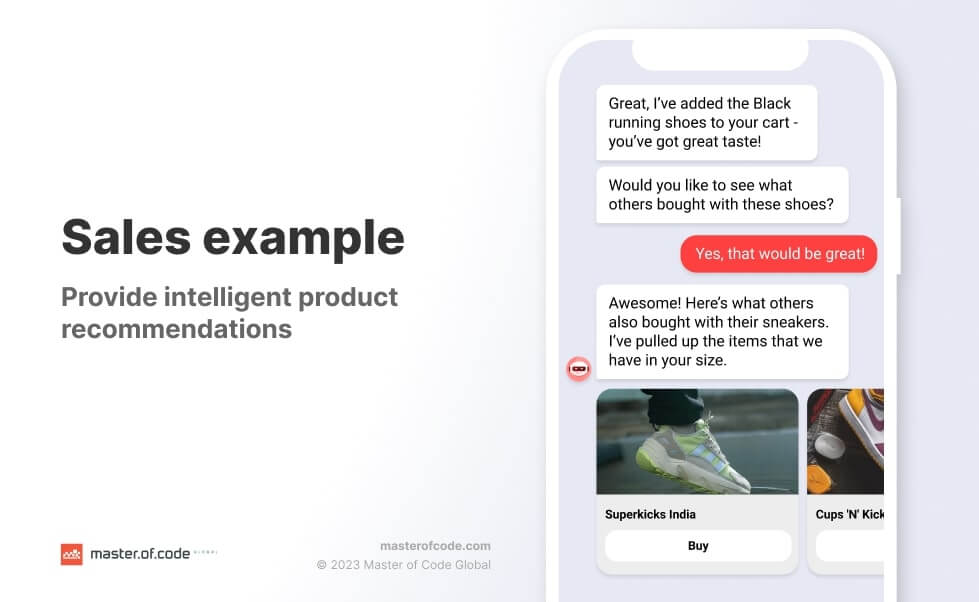
Benefits of Conversational AI solution for Sales
- Personalized Product Recommendations: Conversational AI solutions have the capability to provide intelligent product recommendations to customers based on their preferences and purchase history. This personalized approach helps drive conversational commerce and increases the likelihood of product sales.
- Enhanced Lead Prioritization: By leveraging Conversational AI, sales teams can identify and prioritize high-converting leads more effectively. This focused approach improves conversion rates and ensures that valuable resources are allocated to the most promising opportunities.
- Actionable Customer Insights: Conversational AI platforms gather and analyze customer data, including preferences, behavior patterns, and buying habits. This wealth of information provides meaningful customer insights that can be used to refine sales strategies, tailor messaging, and improve overall customer engagement.
- Increased Sales Team Efficiency: By automating day-to-day sales activities and administrative tasks, Conversational AI frees up valuable time for sales teams. Repetitive and time-consuming tasks such as data entry, appointment scheduling, and follow-ups can be automated, allowing sales professionals to concentrate on building relationships and closing deals.
- Real-time Sales Support: Conversational AI solutions offer real-time support to sales teams, enabling them to access connected knowledge sources and retrieve relevant information instantly during sales calls. This includes access to product details, pricing information, and competitive insights. Having this information readily available enhances sales conversations and empowers sales professionals to address customer inquiries effectively.
Conversational AI solution for Human Resources teams
By leveraging AI technology, HR teams can witness a significant improvement in workforce productivity, with a potential boost of up to 59% according to Nielson Norman. Additionally, Conversational AI enhances employee satisfaction, leading to improved retention rates and reduced hiring and training costs. The implementation of AI-powered chatbots also frees up valuable work hours, saving around 12,000 hours annually by automating tedious tasks. This enables HR professionals to focus on high-value priorities and create a more efficient and satisfying work environment.

Benefits of Conversational AI solution for Human Resources team
- Increases productivity through automating and streamlining tasks such as vacation or sick leave requests, scheduling meetings, task reminders, and generating reports. 61% of employees say AI has improved their productivity at work (Oberlo).
- Provides real-time answers to questions and access to information.
- Rapidly gather and analyze internal data needed to improve overall employee experience, from recruitment, to training.
- Enhance employee learning outcomes by developing engaging training materials for employees, improving performance and allowing your organization to reach its learning and development goals.
Application of Conversational AI across Various Industries
Across various industries, the application of Conversational AI is observed in complex use cases, contributing to transformative changes in customer experiences and operational strategies. In sectors ranging from banking and telecommunications to hospitality and beyond, Conversational AI’s impact is crucial in cultivating great customer engagement and enhancing service delivery dynamics.
Conversational AI use cases across various industries include:
- Enhancing Banking Customer Support: Conversational AI tools present an array of impactful applications for banking industry, ranging from delivering personalized financial guidance and analyzing transactions to tracking expenses and issuing timely notifications. This empowers users to make informed choices, optimize financial behaviors, and fortify security measures. Seamlessly integrated into banking services, Conversational AI not only reimagines customer service but also nurtures financial literacy, thereby fostering a more responsive and secure banking environment. Crucially, conversational banking empowers banks to efficiently capture customer intent, execute account inquiries, facilitate money transfers, provide personalized services, intelligently drive sales and upselling, authenticate customers, address FAQs, and perform essential tasks like card reporting and PIN resets. By harnessing these technologies, banks can offer uninterrupted, convenient, and secure services, cementing their position in the competitive banking landscape.
- Seamless Conversations in Telecommunications: Conversational AI has brought remarkable transformations to the telecommunications sector, introducing a diverse range of impactful applications conversational commerce in Telecom. Through the integration of voice assistants and chatbots, customer experiences are streamlined, encompassing bill inquiries, service activation, technical troubleshooting, and product information retrieval. This technological advancement not only enhances customer engagement but also optimizes operational efficiency. Notable benefits of Conversational AI in the telecom industry include round-the-clock customer support, reduced support costs, personalized assistance, efficient self-service, and heightened customer satisfaction.
One notable example of Conversational AI’s impact is the Telecom Virtual Assistant developed by Master of Code for a telecom company. This solution empowers customers with seamless service inquiries, bill payments, technical support, and simplified navigation through service options, ultimately shaping a more responsive and customer-centric telecom experience.
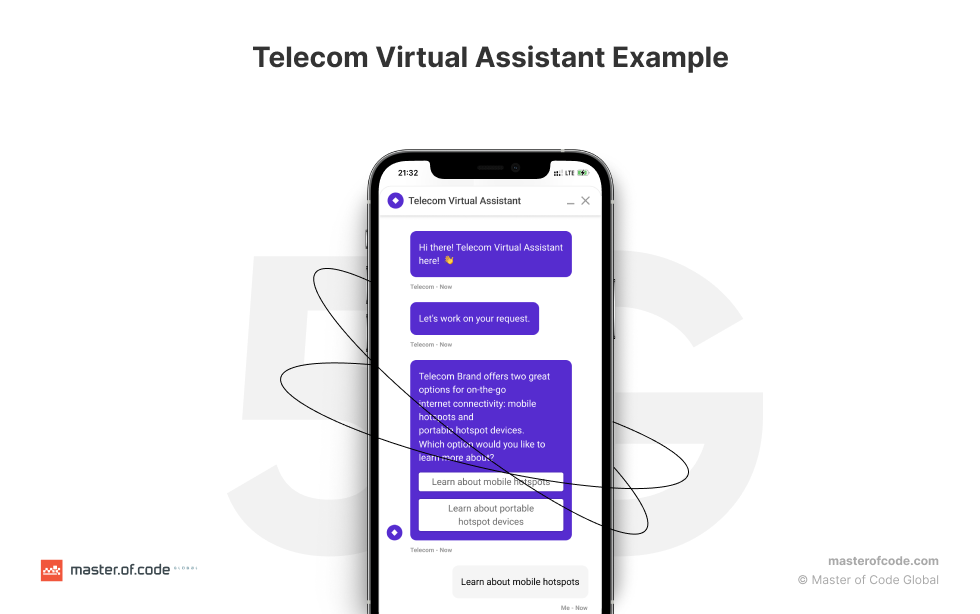
- Enhancing Dining Services: Conversational AI is adept at managing bookings, including cancellations and confirmations, efficiently taking orders over the phone, and recording complete call transcripts for issue resolution. Additionally, Conversational AI handles order inquiries and customer complaints, ensuring smooth interactions. It also shines in providing real-time answers to frequently asked questions and delivering personalized services based on customer history. The benefits of integrating Conversational AI in restaurants span streamlined booking processes, precise order management, enhanced customer service, efficient issue resolution, and a more personalized dining experience, altogether reshaping the restaurant landscape for the better.
- Optimizing Insurance Assistance: Conversational AI has revolutionized the insurance landscape by providing a multitude of benefits for both providers and customers. These AI-powered chatbots offer streamlined policy management, personalized insurance quotes, and product comparisons. Customers gain instant access to policy information, coverage details, and renewal dates, simplifying policy management. Additionally, these chatbots utilize customer data to generate tailored insurance quotes, enabling well-informed decisions. Moreover, the ability to cross-compare different insurance products empowers customers to make comprehensive selections. Beyond this, Conversational AI plays a pivotal role in insurance operations, encompassing efficient intent capture, intelligent call routing, claim management, policy modification, payment handling, personalized service, upselling, and responding to frequently asked questions. This technology transforms insurance interactions, enhancing customer experiences and bolstering service quality across the industry.
- Elevating Hospitality Experience: With the integration of Conversational AI into the hospitality sector, a range of advantages emerges. These include the facilitation of intelligent call routing, simplified booking procedures for accommodations, dining, and spa services, as well as automated concierge services. The application of Conversational AI also extends to addressing commonly asked questions promptly with real-time customer information, crafting tailored guest experiences based on individual histories, and enabling effective upselling opportunities. This comprehensive integration results in improved operational efficiency, increase customer satisfaction, and the ability to offer personalized and engaging interactions, ultimately reshaping the landscape of hospitality services.
Highlighting an exceptional instance of Conversational AI in the hospitality sector is the Luxury Escapes Travel Chatbot. Created in partnership with Master of Code Global, this chatbot has redefined luxury travel experiences by offering personalized and engaging interactions to travelers. Launched in 2019, the chatbot achieved a remarkable 3x higher conversion rate than their website and generated over $300,000 in sales revenue within just three months. Its success underscores the potential of Conversational AI to enhance user engagement and amplify brand influence within the dynamic landscape of hospitality.

- Transforming Retail Experiences: In the retail landscape, customer service industry Conversational AI are transforming user experience and sales efficiency, elevating brands in the competitive market. Personalized product recommendations stand out as a significant application, where chatbots use AI algorithms to analyze customer data and suggest tailored products, driving higher order values. Chatbots also excel in providing real-time order tracking updates, reducing inquiries, and serving as essential store locators, enhancing both online and offline shopping experiences by efficiently guiding customers to products and physical stores through accurate geolocation data.
Overall customer satisfaction
Conversational AI for customer service offers several benefits to enhance overall customer satisfaction, including:
- Provide quality service 24/7. More than half of an organization’s customer base expect businesses to be available at anytime (Gitnux).
- Enable customers to easily resolve their queries autonomously.
- Reduce wait times, increasing customer satisfaction by up to 33% (Cognigy).
- Service customers in their preferred language, resulting in a higher likelihood of sales. 72% of shoppers are more likely to buy a product offered in their preferred language (Hootsuite).
- Create hyper-personalized conversations with your customer, driving revenue and building meaningful relationships.
- Deliver a more consistent CX, building brand loyalty and increasing customer retention.
Conversational AI plays a vital role in customer service, offering significant benefits and enhancing the overall customer experience. By providing quality service 24/7, enabling autonomous query resolution, and reducing wait times, Conversational AI solutions boost customer satisfaction. Additionally, serving customers in their preferred language and creating hyper-personalized conversations drive revenue and build meaningful relationships. The consistent CX delivered through Conversational AI fosters brand loyalty and increases customer retention rates. Overall, Conversational AI empowers businesses to deliver exceptional customer service and achieve higher levels of customer satisfaction and loyalty.






